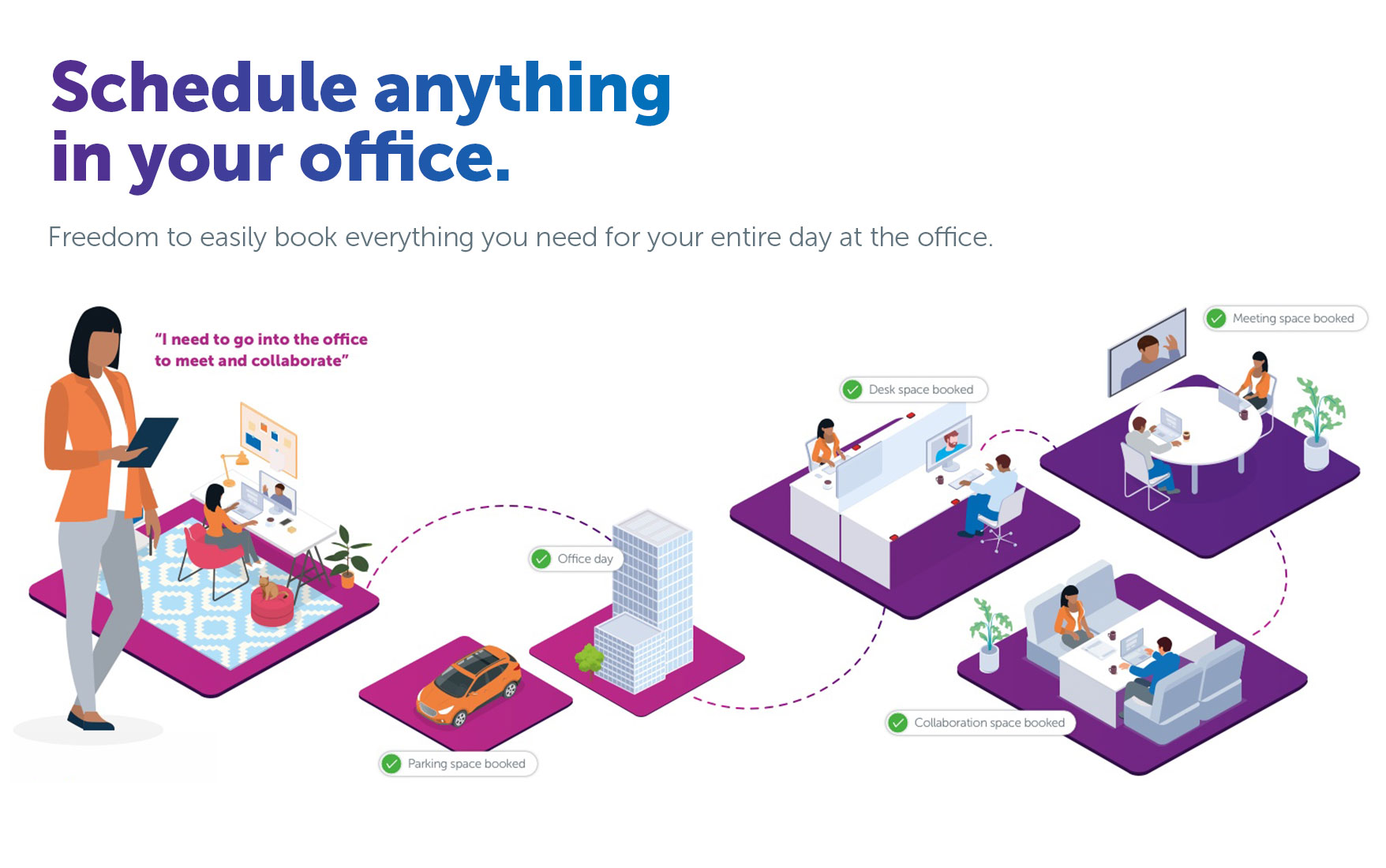
In the future, organizations will want to enable employees to #ScheduleAnything they need in the workplace. Giving them freedom and choice in how and where they work will be the key to the future of work.
60% (of companies) will stick with a hybrid model involving a mix of office-based and remote work. ~ Forrester, quoted in Forbes.
What needs to be scheduled is dependent on the decisions and direction the organization takes for the next 3-5 years. There are a number of questions that need answering that determine what resources will be scheduled on the workplace technology solutions required to enable this, however by this time next year, organizations will need to empower employees to schedule resources in ways they have never previously.

Whether that resource be a desk, a meeting room for collaborating with colleagues, customers and partners, a tribal space for socializing, a parking space, or a drop point for deliveries, the workspace will be driven by activity-based working. Physical resources will be digitized and move from dedicated resources for one person to fractional resources used by many. The same way Uber changes transportation and Airbnb accommodation through the ability to easily find, schedule, book and use their resources, so the future workplace will move to fractional usage driven by the activities performed in that space at that point in time.
Embracing the change
This change to scheduling anything is driven because most organizations will have changed their working styles as we look ahead towards the requirements of the 2021 office. There are four options that will determine if working styles will change. Organizations face the following four choices:
- Remain as they were pre-Covid. These organizations will return to work as if nothing had happened. The same people will go to the workplace the same as they did before, sit in the same desks, use the same meeting rooms, park in the same parking spaces. Before anyone says, “no-one will go back exactly as they did before”, Condeco’s research estimates in the region of 17% of customers will remain as they were. There is solid logic for this driven by the nature of their business. Media, for example, requires in-person collaboration to be effective. We have all watched socially distanced productions over the last year that are just not the same entertainment value as they were pre-pandemic. It makes perfect sense for these businesses to revert to their previous working styles.That leaves 83% of organisations that will make one of three alternate choices.
- Reduce the amount of their real estate.
- Reimagine the workplace and redesign it.
- Or both reduce and redesign.
Most probably the largest organizations with the largest real estate portfolios will do both and smaller organizations will choose one based on their circumstances and working style. In any of these three options there will be a change in the working styles.
These decisions are driven by a range of variables from the cultural direction an organization wants to take post-pandemic to when leases are up for renewal to the needs of the business they are in, however all will have one commonality, that employees will not visit the office as regularly as they did in the past.
This simple change drives an array of other changes to support this one simple fact. When a desk moves from a permanent space to a fractionally used space, it must be booked. It not only makes no economic sense to allow someone who used to work in the office five days a week to keep their permanent desk if they only work remotely even for only one day a week, it damages the socialization aspect of the office, having empty spaces makes the office feel less welcoming.
The office of the future will be used for collaboration, socialization, and to support activity-based working focused on activities that are most productive for being in the office.
Vacant spaces are cost-ineffective and are detrimental to the social fabric of an office, therefore they will be shared and in turn they will need to be scheduled and booked.
Empowering activity-based working
When a space moves from permanent usage to fractional usage then that space must be booked in advance to avoid conflicts and to ensure effective use. The next few years will be challenging economically due to the impact of the Covid-19 crisis, it will be essential organizations maximize the financial return from their resources both real estate and people.
Organizations will empower employees to work where they will be most productive.
Workers will check when space they need is available, who else they want to collaborate with is in the office on a given day, and find and schedule the right space. If a marketer or product designer goes to the office to gain access to a resource they don’t have remotely, for example a 4K screen because they need the fidelity of the screen to perform their work, and they arrive at the office only to find there are no desks with 4K screens, they have a wasted commute and a drop in productivity.
However, it is not only the desk and the screen that needs to be booked, they may need to book a parking space, meeting rooms, collaboration spaces, perhaps schedule a pick up location for deliveries, any number of different resources that need to be scheduled, Condeco has customers scheduling spaces as diverse as seats on corporate transport and hazmat suits, a fully digitized workspace means different things to different organizations.
In the move to activity-based working, workspace is reimagined for collaboration and socialization. People go to the office because they have a need, or desire, to collaborate with their colleagues in-person. The pandemic has shown that above all we are human with human needs for meeting other people, to collaborate, to socialize, and to be human. The future of the workplace is one where people come to an office because it will make them more productive not merely because it is there.
*Thank you to Mike Pilcher, Chief Sales Officer for writing this article.



